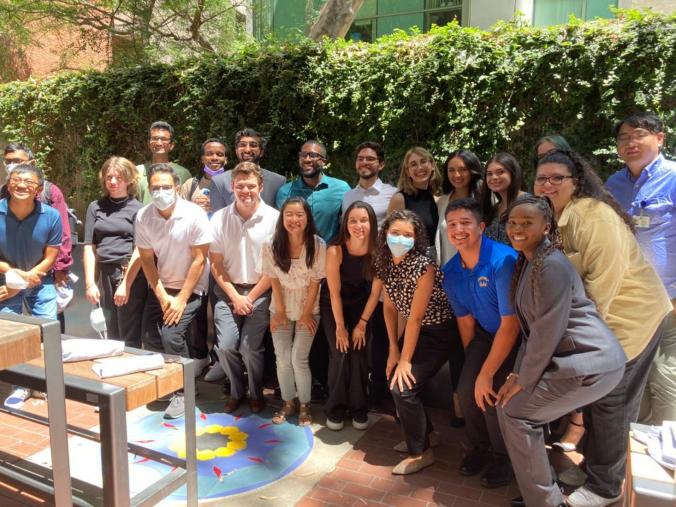Nationwide Undergraduate Cohort Spends "BIG" Summer in UCLA Dentistry Labs

As summer winds down, a group of 20 college students from across the country is reflecting on their collective experience conducting graduate-level research in the UCLA School of Dentistry for two months.
The undergraduate cohort spent mid-June through mid-August working alongside Dr. David Wong and other SOD faculty members in a R25 training program titled Bruins in Genomics: Dental, Oral & Craniofacial Research Training Program (BIG DOC). Developed to address the need for researchers and practitioners in this field from diverse backgrounds with strong data science skills, the initiative received the green light following a $1.6 million grant from the National Institute of Dental and Craniofacial Research, a division of the National Institutes of Health, in January 2021.
“The future of oral health research will be foundationed on genomic sciences and the ability to deploy at the clinical and patient level for personalized and precision medicine/dentistry,” said Wong, who co-authored the successful grant request along with Dr. Alexander Hoffmann, director of UCLA’s Institute for Quantitative and Computational Biosciences.
The BIG DOC cohort had a two-pronged focus within the overarching liquid biopsy (tumor biomarkers within blood or other biospecimens such as saliva) research conducted year-round in the School of Dentistry’s David Wong Lab. Analyzing the ratio of long and short reads among ultrashort DNA sequences, as well as measuring the similarity and biological relevance of soft-clipped regions among those same sequences, the cohort was able to predict with strong accuracy whether a saliva sample came from a healthy patient or one with gastric cancer.
“This showed that the ratio is a relevant feature to include as a predictive factor in a larger neural network machine learning model to predict cancer from liquid biopsy samples,” explained Tim Lindsey, a fourth-year computer science major at Biola University. “Along with this, we discovered that the soft-clipped regions exhibited statistically relevant similarity along with significant chromosomal coverage, and thus hold pertinent information that warrants further investigation.”
Wong, who has dedicated over 15 years of his career to studying the biological information that lies within saliva’s DNA through non-invasive technology his team developed, delighted in watching these burgeoning data scientists at work in Westwood.
“It was immensely gratifying to present research training and curriculum for the diverse, underrepresented, talented undergraduates from universities nationwide who came to UCLA for an intense training in genomic sciences and medicine, with a focus on dental, oral and craniofacial research,” said Wong, who mentored the inaugural summer 2021 BIG DOC remotely due to the COVID-19 pandemic.
Meanwhile, the budding scholars recognized the special opportunity to learn from Wong and many of his colleagues.
“Dr. Wong was an instrumental mentor to my summer experience, and has played a large role in helping direct my future career goals as a researcher,” said Manuel Ernesto Cortes, a computer science and biomedical engineering double-major at the University of Florida. “One piece of advice he left us with was that this world is filled with an unparalleled amount of opportunity: if you have a particular set of interests, you need not compromise between them, but rather focus on bridging them together to create something you find fulfilling.”
Lindsey has returned to his university in Orange County with an enhanced skill set and pride in advancing cancer research.
“BIG is one of the most unique programs in the world. It not only allowed me to take graduate-level bioinformatic courses taught by top researchers but also to take my computational and mathematical skills and apply them to real-world data. In my opinion, data does not get more real than a liquid biopsy and DNA sequencing. The research done at UCLA and the BIG program is very cutting edge, and it was a great experience to be a part of a truly new frontier in the scientific world.”
The application period for BIG DOC 2023 has already opened, with the first deadline for early review on Jan. 3, 2023.
